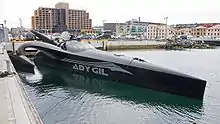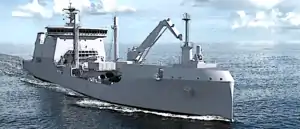Wave-piercing hull
A wave-piercing boat hull has a very fine bow, with reduced buoyancy in the forward portions. When a wave is encountered, the lack of buoyancy means the hull pierces through the water rather than riding over the top, resulting in a smoother ride than traditional designs, and in diminished mechanical stress on the vessel. It also reduces a boat's wave-making resistance.

MY Ady Gil in 2009
Design theory calls for very long thin hulls, so in practice most are multi-hulls such as catamarans and trimarans.
The main current usage areas are passenger ferries[1] and naval ships.[2]
See also
- Type 22 missile boat
- Axe bow
- Inverted bow
- HSV-2 Swift
- HMAS Jervis Bay (AKR 45)
- Zumwalt class destroyer
- Earthrace, later renamed MY Ady Gil
- Incat, a pioneer of the design
- Tumblehome hull form
- USA 17: a boat that raced in the America's Cup
- USS Independence (LCS-2): high-speed trimaran warship
- Very Slender Vessel
- Norwegian Cruise Line Project Leonardo-Class Cruise Ships
References
- Tarantola, Andrew. "Monster Machines: The World's Fastest Boat Is Basically An Aquatic Concorde Jet". Gizmodo. Retrieved 7 June 2018.
- "Rolls-Royce wins first Environship order". MarineLog. Retrieved 7 June 2018.
This article is issued from Wikipedia. The text is licensed under Creative Commons - Attribution - Sharealike. Additional terms may apply for the media files.
